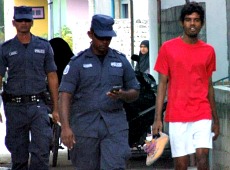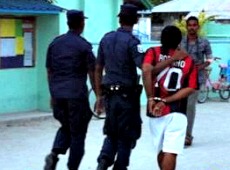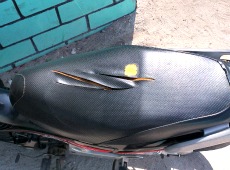Two men were arrested while playing football on Kan’ditheemu island in Shaviyani Atoll during President Dr Waheed Hassan Manik’s visit on January 26, one of whom remains in police custody.
Police Spokesperson Hassan Haneef confirmed to Minivan News that “one person from Kan’ditheemu island in Shaviyani Atoll has been arrested for obstructing police duty and is being held [in the regional capital] Funadhoo for 10 days.”
A source with knowledge of the police investigation confirmed two men had initially been taken into police custody, however one was released without charge.
“The police are responsible for security issues and made a decision based on the rule of law,” Kan’ditheemu Island Council President Nasrullah told Minivan News.
Multiple witnesses from Kan’ditheemu claim that Ahmed “Aabe” Agil was “forcefully” arrested, despite not breaking any laws or causing any disturbance.
 Hussain Naushaad, a 19 year-old football player, was also arrested and held in police custody for two hours on Kan’ditheemu. He was released upon Waheed’s departure.
Hussain Naushaad, a 19 year-old football player, was also arrested and held in police custody for two hours on Kan’ditheemu. He was released upon Waheed’s departure.
Approximately 30 minutes prior to Agil’s arrest, around 25 youth primarily consisting of students were “warming up” for the daily afternoon football match, on the pitch across the road from Shaviyani Atoll School. The footballers were passing balls back and forth on the main road of Bodu Magu, sources stated.
At the same time, Waheed was headed towards the school, but had not yet arrived.
Naushaad claimed he accidentally kicked the football into the school wall twice.
“A police officer from Funadhoo came and said ‘don’t hit the wall again’. The officer waited some time and then left, so we kept practicing.
“I passed the ball again and it hit the wall, which is when the police officer came and arrested me,” Naushaad explained.
A witness told Minivan News that when Naushaad was arrested many of the players commented to police that “this is not good” and “this is not the way you have to act”.
During the football match that took place immediately following Naushaad’s arrest, two footballs were inadvertently kicked over the fence and into the road. The police then confiscated these balls, according to witnesses.
“If play is prohibited then you must say that before we start. The police came and took two balls that went on the road but never said to stop playing,” sources explained.
According to one witness, Agil told the police “even if you take those balls, we can still keep playing.”
“The police don’t have a legitimate answer [for why he was arrested]. The real problem is that he talked back to the police,” the witness added.
“Most of those playing were students and everyone was shouting ‘baghee’ [traitor], but not directly to any officers in particular,” a witness said.
According to another witness, police believed Agil was “purposefully causing a disturbance and they suddenly ran onto the field and arrested him.”
“He was not resisting arrest or speaking, but the police still took him forcefully. There was no need for that,” another witness said.
“They took him because they are [Dhivehi Rayyithunge Party] bagees and they wanted to arrest him,” yet another witness remarked.
The sentiment was echoed by a further witness: “this is baghee nonsense,” he said.
Agil was arrested in his football practice gear and was not permitted to take a change of clothes, nor did the police inform his wife as to why he was being arrested or how long he would be in police custody, according to a source close to Agil’s wife.
The source added that Agil was being held on Funadhoo and has been permitted to call his wife once a day under strict supervision. He was periodically being taken to the court on a nearby island, because there is no magistrate present to preside over the Funadhoo court.
Agil was initially being held for five days, however this was later extended to 10 days.
Police provoking political polarisation
“This is a sad issue. Aabe is a very, very important youth member of our community. I do not want or like to see anyone arrested,” said the Island Council President, Nasrullah.
A source on Kan’ditheemu alleged the island council keeps a list of Maldivian Democratic Party (MDP) activists for police, Progressive Party of Maldives (PPM), and DRP members to “concentrate on”.
The same source claimed that DRP and PPM members are threatening MDP supporters living on Kan’ditheemu, particularly those not originally from the island.
“They are making problems and saying that if those people are supporting the MDP, they will come against them. The day after Waheed’s visit, MDP members had their property destroyed. Motorcycle seats and hanging laundry were slashed with a knife,” the source added.
Asked about these allegations Nasrullah stated, “The 100 percent truth: there is no list of MDP members being targeted, the island council is not supporting this.
“Inappropriate graffiti was also put on an island council member’s wall. We want people to come and visit our island, there will be no one kicked off Kan’ditheemu. No one at the island council level has agreed to such things,” he added.
A source close to the island council stated that youth on the island were just angry about the arrest and were spreading rumours.
“President Waheed’s trip was successful, but sad things have happened because of it. I’m very sorry, deep in my heart I cried,” the source added.
While visiting Kan’ditheemu, President Waheed “expressed [his] appreciation of the unity of the people of Kan’ditheemu in working towards the development of the island, steering clear of any differences.”

